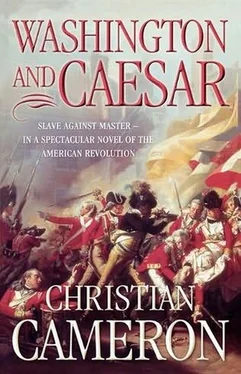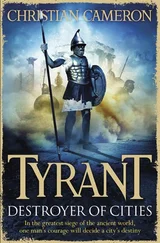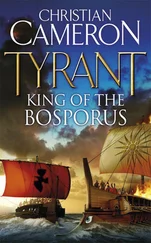Christian Cameron - Washington and Caesar
Здесь есть возможность читать онлайн «Christian Cameron - Washington and Caesar» — ознакомительный отрывок электронной книги совершенно бесплатно, а после прочтения отрывка купить полную версию. В некоторых случаях можно слушать аудио, скачать через торрент в формате fb2 и присутствует краткое содержание. Год выпуска: 0101, ISBN: 0101, Издательство: HarperCollins, Жанр: Исторические приключения, на английском языке. Описание произведения, (предисловие) а так же отзывы посетителей доступны на портале библиотеки ЛибКат.
- Название:Washington and Caesar
- Автор:
- Издательство:HarperCollins
- Жанр:
- Год:0101
- ISBN:9780007389698
- Рейтинг книги:3 / 5. Голосов: 1
-
Избранное:Добавить в избранное
- Отзывы:
-
Ваша оценка:
- 60
- 1
- 2
- 3
- 4
- 5
Washington and Caesar: краткое содержание, описание и аннотация
Предлагаем к чтению аннотацию, описание, краткое содержание или предисловие (зависит от того, что написал сам автор книги «Washington and Caesar»). Если вы не нашли необходимую информацию о книге — напишите в комментариях, мы постараемся отыскать её.
Washington and Caesar — читать онлайн ознакомительный отрывок
Ниже представлен текст книги, разбитый по страницам. Система сохранения места последней прочитанной страницы, позволяет с удобством читать онлайн бесплатно книгу «Washington and Caesar», без необходимости каждый раз заново искать на чём Вы остановились. Поставьте закладку, и сможете в любой момент перейти на страницу, на которой закончили чтение.
Интервал:
Закладка:
As he watched, a British field piece fired-a tiny white blossom of smoke against the bleak gray landscape and the darker lines of their revetments. None of the sentries moved. The ball fell just short, splattering them with mud, hopped a little on a short graze, and rolled over the harder ground by the parapet. One of the sentries leapt after it, placing rocks in its path to slow it. It was a small ball-perhaps a four-pounder, or a six. At this distance, Washington couldn’t tell, but he hoped the sentry wouldn’t be fool enough to try and stop it before it had lost more energy. Men had lost feet by such antics.
It stopped on its own, and the man flourished it triumphantly at his mates and carried it back to his post, where he put it on a small pile of shot. All three men appeared animated.
Washington folded the telescope and handed it to its owner.
“War does not seem to have a terrifying aspect today.”
Lee brought it to his eye in a practiced movement. He swept it over the harbor, then over the town, then slowly along the lines.
“That’s the King’s Own in the lines today,” he said. “Blue facings, and those well-cocked hats.”
Washington smiled. A sharp regiment. Both had noticed over the months the careful attention the Fourth gave to their uniforms and drill.
A wheelbarrow pushed by two men came down the road past Washington’s staff. Neither man saluted, particularly, although both inclined their heads in a civil enough way. They pushed their barrow down the long slope to the advanced post where the sentries were once again huddled against their fleche.
“If we allow these enlistments to run out, every watch coat and blanket we issue will be lost. It is not so much that we lose the army,” Lee was never at his best when talking about the Massachusetts men, “as the difficulty we endure in losing the arms and accoutrements.”
“Nevertheless, General, I wish to procure more blankets, and see them issued immediately.”
“Of course, sir.”
“How many requests have we written for blankets?” He turned and held out his hand for the glass again, and one of his staff dismounted and opened a saddlebag to retrieve a volume of the army correspondence. They had such volumes now, and daily returns for equipment and ammunition. The Virginia Farmer knew how many bayonets were available in every regiment (too few) and who had muskets with slings. That much he had accomplished, and just the lists had taken him a month. Equipping them might take years, and the pressure from Congress was mounting. He had to evict the British from Boston before they were relieved by a huge fleet and thousands of men who might break his lines and boil out into the countryside, or so the Congress feared.
Lee handed the glass over again.
“A very fine instrument, General.”
“Thank you, sir. I had it last week from London.”
Most of the staff were dismounted now, pulling at flasks or lighting pipes while they all ran through whatever documentation was handy. Washington insisted that when he was away from headquarters, business must continue on horseback. He smiled ruefully at the provenance of the telescope; his sword was from London, and his pistols, and much of his war material. So far, the war had served better than all George Mason’s sermons to impress on him how essential were the ties of trade between the American colonies and their mother country.
The wheelbarrow had arrived at the sentry post. The three sentries were helping the two other men load their collection of British cannonballs into the barrow. There were several calibers, four-pounders and six, and one larger ball that might have come from a ship in the harbor with her big twelve-pounders. One of the men with the wheelbarrow paid the sentries. Washington could see the paper scrip changing hands. He shook his head. The wheelbarrow began creeping crabwise across the hill, toward the small battery that the Massachusetts gunners had sited and built so laboriously in late August.
“General Washington?” An apple-cheeked staff officer with the diction particular to the graduates of the Yale Divinity school. Washington nodded courteously and looked down.
“We have written for blankets eight times, and watch coats twice, sir.” The man smiled, proud of the speed with which this gem of knowledge had been discovered and polished.
“Pray mention it in the draft for a ninth letter.”
Lee chuckled mirthlessly. “In time, there won’t be a farmer in this colony we haven’t provided for.”
“General Lee, I do not always find these remarks helpful.”
Lee turned his head, respect warring with an almost overwhelming desire to answer sharply and the struggle plain on his face. Washington put the glass back to his eye. He meant the rebuke, but hoped that Lee would accept it and not reply. General Lee was a first-rate soldier, and Washington could not imagine what the summer would have been like without him. Certainly, General Arnold’s expedition would not have been sent to Quebec even as late as it had been. If Washington now commanded the army, Lee commanded the staff.
The wheelbarrow had finally reached the distant artillery. Washington was warm from the waist down, where the heat of his horse bathed his legs and coat. Above the waist, the wind pushed through his coat and the salt sea air kept him damp and cold. His fingers were becoming painful in the mornings. He kept the glass to his eye, shutting out Lee’s possible insubordination. The Yale man was still by his stirrup. I should have held my tongue until we were alone. That was ill done.
The artillerists were loading their six-pounder. Washington knew it was the six-pounder because it was bronze, a captured French piece from the last war and one of the truest in the service, and the polished barrel glinted in the gray light. He could see the gun captain whirling his flaming linstock in the air over his head, a very martial sight that stirred Washington faintly.
The linstock came down across the breech of the gun and it responded instantly with a fine mushroom of smoke. The sharp “bang” of a good shot and dry powder followed a moment later. The depression of the shot was too low for anyone to follow its fall or its line, but within a few seconds there was a commotion at the British advance post. Washington looked at it through the glass. Three of the smart King’s Own men were gathered around a fourth, prone. Washington could see from the numbers that they had been changing the guard. The downed man was spasming hard, probably screaming, but his voice was lost in the wind and the distance.
“Hit with their own ball,” said Lee, in an odd, strained voice. He had friends in the British Army, but then, they all did.
Washington watched the British pickets making shift to move their wounded man. Every man of them had a watch coat, a musket, and a bayonet, made by the same mills that made most of his army’s equipment. There was blood visible on the mud, even at this distance, and Washington knew from experience that the human body held a prodigious amount of blood. The shot must have taken off a leg.
Washington handed Lee his glass and turned his horse away as the British artillery fired again.
Great Dismal Swamp, October 1775
It took Caesar another week to break the fever, and he was thin and listless, gradually moving from total apathy about food to a raging hunger that he lacked the energy to satisfy. In his fever, he couldn’t imagine what had happened; during his daily moments of lucidity, he still couldn’t understand where the others had gone or where he was himself. Unbeknownst to his rational mind, he crawled every day in his fever, dragging his hot and exhausted body through the tangle of undergrowth in a circle, so that he never awoke from the fever in the same place.
Читать дальшеИнтервал:
Закладка:
Похожие книги на «Washington and Caesar»
Представляем Вашему вниманию похожие книги на «Washington and Caesar» списком для выбора. Мы отобрали схожую по названию и смыслу литературу в надежде предоставить читателям больше вариантов отыскать новые, интересные, ещё непрочитанные произведения.
Обсуждение, отзывы о книге «Washington and Caesar» и просто собственные мнения читателей. Оставьте ваши комментарии, напишите, что Вы думаете о произведении, его смысле или главных героях. Укажите что конкретно понравилось, а что нет, и почему Вы так считаете.












